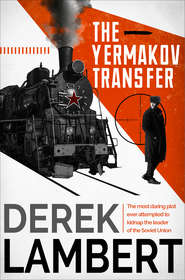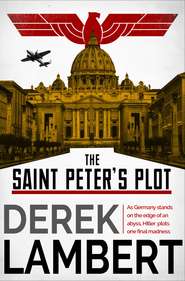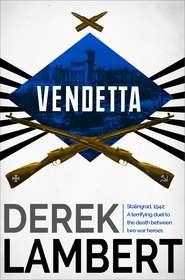По всем вопросам обращайтесь на: info@litportal.ru
(©) 2003-2024.
✖
The Man Who Was Saturday
Автор
Год написания книги
2018
Настройки чтения
Размер шрифта
Высота строк
Поля
Bitch!
He began to fight, thrashing the black water with his legs, clawing at the terrible pressure above, but dragged inexorably down the ice-tube by water-logged newspaper and felt.
He managed to grasp the edge of the ice. Crack. He heard the bones in his fingers snap as heavy boots stamped on them. Crack. Still he held on, not feeling pain anymore, just the cold of the grave.
Boots, kicking, pushing, grinding. Broken fingers uncurled.
Why?
Then he gave up the fight.
Gently, almost gratefully, he slid into the darkness to join the young man he had seen in the light of the flare, realising in the end that he had been beckoning him.
Gazing at Kreiber’s alabaster features in the open coffin in the Institute for World Economy and International Affairs, Robert Calder was nudged by an elbow of fear. How accidental had the deaths of any defectors been? How natural the causes?
In front of him in the queue in the entrance hall Kreiber’s maid, Maria, built like a wrestler, sobbed enthusiastically. She moved on, sniffing into a scarlet handkerchief, Calder took her place directly above Kreiber’s shuttered stare.
According to the post mortem Kreiber’s blood had been lethally charged with alcohol. Another Friday night drunk. Another statistic.
Calder, legal brain blunted but still cynical, didn’t quite buy that. Kreiber’s capacity for hunter’s vodka had been phenomenal and he had been an experienced ice fisherman.
Bowing his head, Calder examined the face that had been spotted two days after his disappearance peering from beneath thin ice between reflections of the cupolas of the Kremlin close to Bolshoi Kammenyi Bridge. They had been ennobled by the mortician but beneath the cosmetics you could still trace wandering lines of indecision.
At least, another defector could trace them. Calder touched his own face. The lines, dye-stamped by doubt, were as indecisive as Kreiber’s. And yet according to the photographs, his features had once been strong, almost fierce, as he strode the campus, climbed Capitol Hill; even as he crossed the divide between Washington and Moscow.
Kreiber, you sad sonofabitch, what happened?
The elbow of fear sharpened.
He left the coffin and joined the group of mourners, mostly defectors who worked at the Institute, waiting to depart for the cremation. The coffin, marooned in the echoing lobby, seemed to be pointing at them.
A blade of cold reached him through a crack in the inner doors of the entrance. Outside, the chilled February breeze nosing through streets still winged with soiled snow would be an executioner – a winter funeral usually dispatched some of the bereaved to their own graves.
Maria was there, stuffing her mouth with sugar-coated red-currants which she fished from a cracked plastic shopping bag. And Fabre, the French defector, creased tortoise face bobbing above the moulting collar of his topcoat, and Langley, the Canadian, one time ice-hockey star and sexual athlete, and … a girl Calder didn’t recognise.
She had grey eyes and her black hair, released from the fur hat she carried in her hand, made an untidy frame for her winter-pale face. Langley, of course, was talking to her but he didn’t seem to be making much of an impression.
‘She’s the new girl in Personnel,’ Fabre informed Calder, lungs making rusty music as he spoke. ‘She keeps our files in order.’
So she was Surveillance. A pity. But you couldn’t blame her: she wouldn’t have any choice.
‘Attractive, ‘Fabre judged, ‘in a distant sort of way, ‘vowels in his English theatrically Gallic.
Distant? Perhaps. When cornered by Langley. But Calder detected a challenge in the set of her eyes and mouth. Her nose was, perhaps, a little too assertive but, having had his own broken in a locker-room brawl at Harvard, he was sensitive on the subject of noses.
Fabre, losing Calder’s attention, turned to Maria. ‘A merciful release,’ he said in cassette Russian, bobbing his head towards the coffin. Startled, Maria stopped chewing. Red juice trickled down her chins like blood. But Fabre didn’t give up that easily. ‘He died for a good cause.’
Maria turned her back on him: the only cause she knew anything about was earning enough money or horse-trading enough merchandise to keep the stew bubbling on the stove. Any other causes unsettled her: they sounded official.
Despite his misgivings, Calder smiled at her. She regarded him suspiciously for a moment, then grinned. It was spectacular, that grin, shining here and there with steel teeth, and it banished Calder’s foreboding. Maria delved into her bag and produced half a dozen white-powdered redcurrants cupped in one hand. She handed them to Calder who chewed them slowly; they were delicious, sweet and sharp. He glanced up and saw the girl from Personnel smiling at him; it was positively unseemly – any minute now they’d all be rolling in the aisles.
Fabre said coldly: ‘This is a funeral not a burlesque.’
Calder was saved by the doorman who, as the last of the mourners trailed past the coffin, herded by a KGB sheepdog in a square-shouldered topcoat, let the cold in. Whoosh, it entered snapping and Calder buttoned up his grey Crombie (Blooming-dales and still wearing well) as the girl put on her fur hat, tucking in her hair with long fingers.
He wondered how much, being in Personnel, she knew about him.
As the red-draped coffin, destined for Donskoi Monastery, was carried down the outside steps by six pall-bearers, their breath smoking with exertion, Maria dug him in the ribs. ‘Come.’ She licked red juice from her lips with the tip of her tongue.
But he didn’t follow her into the blue and white coach, doubling up as transport and hearse, along with the other forty or so mourners. Instead, although he had no intention of attending the last rites, he followed in his black Zhiguli.
He parked the small car in Donskaya Square and waited in it while the coffin and wreaths and red cushion bearing Kreiber’s three Soviet decorations were carried into the monastery, stone walls surrounding the five bunched domes of the cathedral still plastered with old snow. The corpse would be burned immediately, ashes flown to West Berlin in an earthenware casket adorned with a sprightly hammer and sickle. In the final reckoning both sides would be seen to be commendably decent. What harm could a few cinders do?
Through the exhaust fumes billowing past the windshield Calder picked out the defectors among the mourners following the coffin. American, British, German, French, Dutch, Canadian, Scandanavian, Australian … known to the KGB as The Twilight Brigade.
Twilight …. How many of them, trapped between day and night, between dog and wolf, had wondered, as he had done, about the deaths of their fellows?
Donald Maclean, British diplomat and partner in a celebrated defection in 1952, who had died in March ‘83, ostensibly from cancer. Could he have been slipped a few spoonfuls of Brompton Mixture, alcohol, cocaine and heroin? It was said to dispatch patients singing.
Be fair. Even if the mixture had been prescribed it could have been on compassionate grounds. After all it was prescribed in the West freely enough.
And Guy Burgess, Maclean’s partner in espionage and homosexual lush, who had died in his sleep in 1963 in an iron bed in the Botkin Hospital. He had died from booze. But, of course, the simplest way to hasten the death of an alcoholic is to inject him with alcohol.
When Maria and the girl – was she the reason he had driven to Donskaya Square? – had been hustled into the monastery by the shepherd from State Security, Calder drove onto Lenin Prospect and headed for the centre of the city. Tomorrow, he promised himself, such neurotic fantasies would be banished for ever. Unless another defector died too accidentally or too naturally or too soon.
If in doubt consult Dalby.
Calder arranged to meet him late that afternoon beside the waterless fountain at the entrance to Sokolinki Park. You could safely trade indiscretions in Sokolinki’s lonely pastures of snow and belts of silver birch thick with silence.
When Calder arrived on Friday night boozers were already gathering, tilting bottles of vodka bought legally or paid as wages or distilled by the friendly chemist on the corner of the block, banding together in case any of them collapsed, easy prey for teenage muggers.
Hands deep into the pockets of his Crombie, fur hat worn with a jauntiness he didn’t feel, Calder roamed between the burgeoning drunks and the pavilions remaining from international exhibitions. The cold crisped his nostrils.
No sign of Dalby. But, like the Russians with whom he mixed more compatibly than most defectors, he wasn’t noted for punctuality. From the very beginning of his banishment from Britain he had managed to adapt. Calder envied him.
‘Good evening my dear fellow.’
Calder spun round. Dalby still managed to surprise; that was thirty years of espionage for you. He was smiling benignly. Although the slanting lines on his face had settled into pouches Dalby, now in his seventies, still looked like an urbane pirate. He wore a peaked cap instead of a shapka, challenging the cold to take off his ears.
He squeezed Calder’s arm. ‘Come, let’s take a walk.’
They walked down one of the avenues that had once rung to the harness jingle of aristocratic coaches; on either side the snow had been packed hard and bright by children at play and cross-country skiers, but they had departed for the night and loneliness was settling.
Calder glanced at the fountain. He saw a figure detach itself from the boozers and strike out towards the avenue.
‘Is he there?’ Dalby asked.
‘I didn’t know you had a watchdog.’











